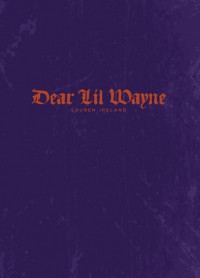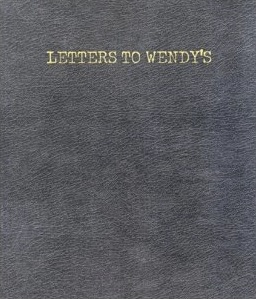 Dear Lil Wayne
Dear Lil Wayne
by Lauren Ireland
Magic Helicopter Press, 2014
62 pages / $11.00 buy from Magic Helicopter
1. Immediately I am reminded of Joe Wenderoth’s Letters to Wendy’s. The cover to his book and Dear Lil Wayne even kind of look the same.
2.

3. The dedication of the book goes to Lil Wayne, but below that another dedication/statement reads: “hip hop, you saved my life.” I think this is particularly poignant. Sometimes when bands are interviewed they’ll say something like, “We get letters from fans telling us that this song/album helped them through a hard time.” The project of this book is proof of the kind of power music can have and I totally relate and understand, as I’m sure many other readers probably can, too.
4. The book has a type of preface in which Ireland gives us some information about Lil Wayne, primarily concerning his incarceration. This preface ends: “I sent these letters to Lil Wayne during and after his incarceration. He never wrote back.” There’s an almost even split of letters written while Lil Wayne was in jail and after he was released.
5. I wouldn’t go so far as to say Dear Lil Wayne is a form of hero worship, but rather an incarnation of the advice, “write about your obsessions.”
6. And in this writing through obsession, Ireland weaves together the comic and tragic for very memorable poems.
7. For example, “September 17 2010”:
Dear Lil Wayne,
Jason and Furst say they get fear boners. Do you? Probably not. Jason says there’s like a Nicaraguan death squad after his dick. Does this mean boys are just as scared as girls? All this time I was sure it was a joke when a boy liked me. In these cases, I don’t get fear boners. I just feel kind of bad.
8. From the first sentence this poem is engaging. The following “Do you?” and “Does this mean boys are just as scared as girls?” maintains a move that appears throughout the book: Ireland is almost always asking Lil Wayne questions in her letters.
9. “September 21 2010” begins, “Do people think you are funny when you are actually really sad?”
10. “November 5 2010” (the day after Lil Wayne’s release) begins, “Do you feel different yet?”
11. “April 10 2011” begins, “Have you ever touched something so painful, you can’t tell whether it’s hot or cold?”
12. These questions, and others throughout the book, provide moments where I really empathize with Ireland. Because even those these poems are addressed to Lil Wayne, the questions Ireland asks are not really questions for him. They are questions the speaker asks herself.
13. And one of the big questions that’s threaded throughout the book is, I think, how does one be “grown-up?”
14. This question comes up most clearly in “September 2 2010”:
Dear Lil Wayne,
One day I will have to be a full grownup, paying taxes on time and shit. Do you know how hard that is? I just want a bus and all the time in the world. Beer tastes so amazing when I skip work for no reason.
15. Other examples that display this youthfulness in opposition to growing up pop up throughout the book. In “January 7 2011”: “I’m like sweating tequila. It’s 4PM and I am lonely and in love and thinking of the time I almost drowned in a lake in Knoxville, Tennessee. No one is ever going to be this happy, ever again.”
16. In “August 24 2010”: “Lately I have been sleepy thuggin over the lazy blankets. What makes pain? Stupid. In 8 million years everyone will be dead. At least I hope. That’ll teach them.”
17. In “April 20 2011”: “Lately, whiskey makes me feel better, all over my parts.”
18. I think all of these examples, and there are many others in the book, show Ireland’s speaker having an internal struggle, of being between the world of adult and the world of technically adult.
19. And this struggle is the heart of Dear Lil Wayne. It’s the second part of the American coming-of-age story. The Catcher in the Rye and The Perks of Being a Wallflower, those are part one. No one in high school reads books about part two. Dear Lil Wayne is part two.
20. And so what’s a reader left with at the end? Ireland leaves us on unstable ground. Some progress is made, but there’s not exactly a happy ending.
21. The one-way correspondence with Lil Wayne ends on April 23, 2011. And the tone of this poem quickly establishes that it’s the end: “Promise me you’ll never get too big for your bitches.” Ireland’s speaker is moving on.
22. Lil Wayne’s music has transformed by the end of the book: “When I’m listening to you, all I can hear is a warm intelligent hum.” The music is no longer defined by certain beats or lyrics. For Ireland’s speaker, it’s something that’s not even hip hop anymore, but is still positive.
23. The last two sentences of “April 23 2011” are what leaves me uncertain: “You are going to be okay. I mean, that’s what we’re supposed to tell each other.”
24. OOF. These last sentences slay. They reflect perfectly the situation that Ireland’s speaker, and I think many twenty and thirtysomethings, feel today. No one is really worried about Lil Wayne here, it is Ireland’s speaker whom the reader hopes is okay. It’s the reader him/herself that says these lines aloud and to friends. But the truth is we don’t know and that’s why this last poem in Dear Lil Wayne has such bite.
25. This last point would be some Lil Wayne lyrics that encapsulate the experience of reading Dear Lil Wayne, but I don’t really know any, sorry.
Tags: 25 Points, Dear Lil Wayne, Lauren Ireland, magic helicopter press
